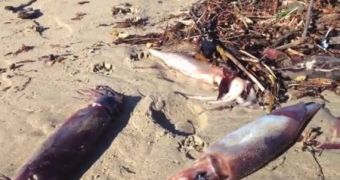This past weekend, some of the beaches near Santa Cruz, California, witnessed the beaching of hundreds of Humboldt squid.
For the time being, marine biologists are still unable to provide any reasonable explanation for these incidents, yet some researchers argue that the squid most likely went searching for a new feeding area, reached ever more shallow waters and eventually ended up on land.
Up until now, Humboldt squid were a rather rare sight in the waters off California's northern coast.
Thus, it is a well-known fact that these marine creatures spend most of their time swimming in the equatorial part of the ocean.
Because of this, their choosing to leave their natural habitats and coming all the way to California has some researchers wondering whether or not it might be possible that climate change, global warming and ocean acidification have had a say in the matter, Huffington Post reports.
Other sources explain that it is also possible that the squid ate some neurotoxins-secreting algae which took their toll on their sense of direction and caused them to head for the beach rather than remain in the open ocean.
The theory that human-made pollutants toyed with these creatures' orientation has not been ruled out either.
Commenting on these theories, Baldo Marinovic, a marine biologist presently working with the Institute of Marine Science at UC Santa Cruz, made a case of how, “It's all very interesting stuff, and there are a lot of theories, but the bottom line is no one knows.”
Interestingly enough, almost all of the squid were juveniles.
The ordinary folk who witnessed these beachings say that the sight was impressive, to say the least. Onlooker Jim Morrison explained how, “Twenty washed up right in front of me. It was like they were committing suicide.”
For the time being, researchers are investigating the content of the squid's stomach, hoping that this might help them figure out what caused them to wash ashore.

 14 DAY TRIAL //
14 DAY TRIAL //